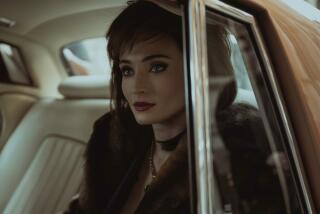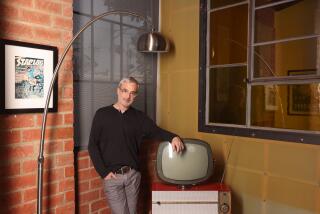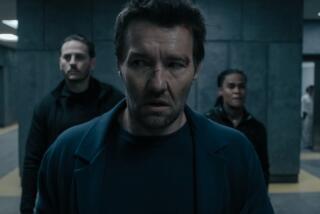Review: ‘Strange Angel’: It’s rocket science with occult twist
The improbable life of rocket scientist Jack Parsons — where jet fuel met “sex magick” — has inspired a television drama, “Strange Angel,” beginning Thursday on CBS All Access, the streaming wing of the broadcast network reserved for more offbeat series.
It occurs to me, even as I write this, that it is the second CBS series (after “The Big Bang Theory”) set against a Caltech backdrop. But there the resemblance ends.
Given the sensational aspects of the story — which includes, alongside the founding of the Jet Propulsion Laboratory and the Second World War, the disciples of British occultist Aleister Crowley and a more-than-cameo appearance by L. Ron Hubbard — it can seem a little pokey. (That it can seem a little silly is unavoidably built into the material.) “Drunk History” told Parsons’ story pretty effectively in seven minutes. But “Strange Angel” is playing a long, multi-season game, and so far only three of the first season’s 10 episodes have been offered for review.
The upside of such a leisurely arc is that it allows for conversations into which exposition is less obviously inserted, and scenes have time to wander before getting to a point. The downside is that, spread across so many hours, the action tends to run in circles over the same ground. And while this is helpful dramatically — decisive action in fiction requiring more discernible motivation than the tumbling about that describes real life — it means that some of the characters can become a little wearing. I’m not sure Jack is meant to be quite as obnoxious as he begins to seem.
While Parsons keeps his name, every other fact-based character gets a new identity, allowing creator-writer Mark Heyman to play freely with their facts. Wife Helen becomes wife Susan (an excellent Bella Heathcote); eventual rocket team member Apollo Milton Olin Smith becomes Samson Hunt (Zack Pearlman) and Tsien Hsue-shen is called Gui Chang (Keye Chen). Theodore von Kármán, who ran Caltech’s aeronautical lab, is recast as the doubting Prof. Filip Mesulam (Rade Serbedzija).
When we meet him, in late-1930s Los Angeles, Parsons (Jack Reynor) is a fresh-faced, soft-featured fellow whose well-trimmed mustache seems a hedge against looking like a child. He works days in a gunpowder factory and at night heads off into the scrub to shoot off rockets just outside Pasadena city limits with his pal Richard Onsted (Peter Mark Kendall), a character that combines real-life mathematician Frank Malina and Parson’s childhood friend and fellow rocketry enthusiast Edward Foreman.
The mixed success, which is to say the predominant failure, of their experiments does not deter Parsons from thinking big; a devotee of science fiction and pulp fantasy, in the late 1930s he already has his eye on sending a man into space. In his off hours he dreams of spiritual transcendence.
Heyman makes Jack the prime mover in the show’s scientific researches, even as he throws stones in his way that history may have failed to provide — a disapproving, scripture-quoting father-in-law (Michael Gaston) who dresses his tight-fistedness as largesse, colleagues whose interest in careful methodology runs counter to Jack’s need to make things happen fast. It’s a matter of saving his marriage.
Indeed, though Parsons is the series’ avowed subject, “Strange Angel” seems to be most effectively the story of his wife, Susan. Jack, who had once promised to fill her life with music and art and to get her from under her father’s economic thumb, is never around and always short of cash. Their lovemaking, about which she’s conflicted, is shown as (for her anyway) drab. Perhaps she would be less conflicted if it were better lovemaking.
We know she has hidden passions because she listens to “The Rite of Spring” on the Victrola and by the way she fingers her necklace thoughtfully as she regards the Bohemian partying across the way — the universal dramatic sign for evolving sexual consciousness.
In the early episodes, much of the story plays out as a classic weird-neighbor psychological thriller. Is the oddball who moved in next door (Rupert Friend as the fictional Ernest Donovan), in the dead of night, a threat? He drives a motorcycle, he has a knife! He seems menacing even when he acts helpful; a thin veneer of amity coats the provocative questions he asks.
It may not surprise you to learn that Ernest will be Jack’s bridge to the occult — once he paraphrases Crowley’s well-known, self-justifying dictum “Do what thou wilt shall be the whole of the law,” that game is given away. Friend plays him with a prairie twang and creepy-crawly attitude that smacks a little of Charles Manson.
“There’s a part that’s trying to burst free and another part that needs to keep it in control,” Ernest says to sum up Jack’s explanation of how a rocket works. Of course this is about more than rockets, just as when Jack says, “You can’t know what’s enough ’til it’s more than enough,” as he pushes an experiment to its limits.
The Hubbard chapter of Parson’s life is reportedly reserved for a later season, and it will be interesting to see whether the founder of Scientology is identified outright or becomes R. Lon Hubble, the founder of Scientificism, or something of the sort. That would seem the cautious route, historically speaking.
‘Strange Angel’
Not rated
Where: CBS All Access
When: Any time, starting Thursday
ALSO
‘Manhattan’ an egghead’s-eye view of the birth of the atomic bomb
Life as Satanist Propelled Rocketeer
A new generation of L.A. Satanists finds community in blasphemous times
‘Cameron: Songs for the Witch Woman’ at MOCA/PDC
The ever-changing ‘Archer’ finds inspiration in classic L.A. noir
Follow me on Twitter at @LATimesTVLloyd
More to Read
The complete guide to home viewing
Get Screen Gab for everything about the TV shows and streaming movies everyone’s talking about.
You may occasionally receive promotional content from the Los Angeles Times.







